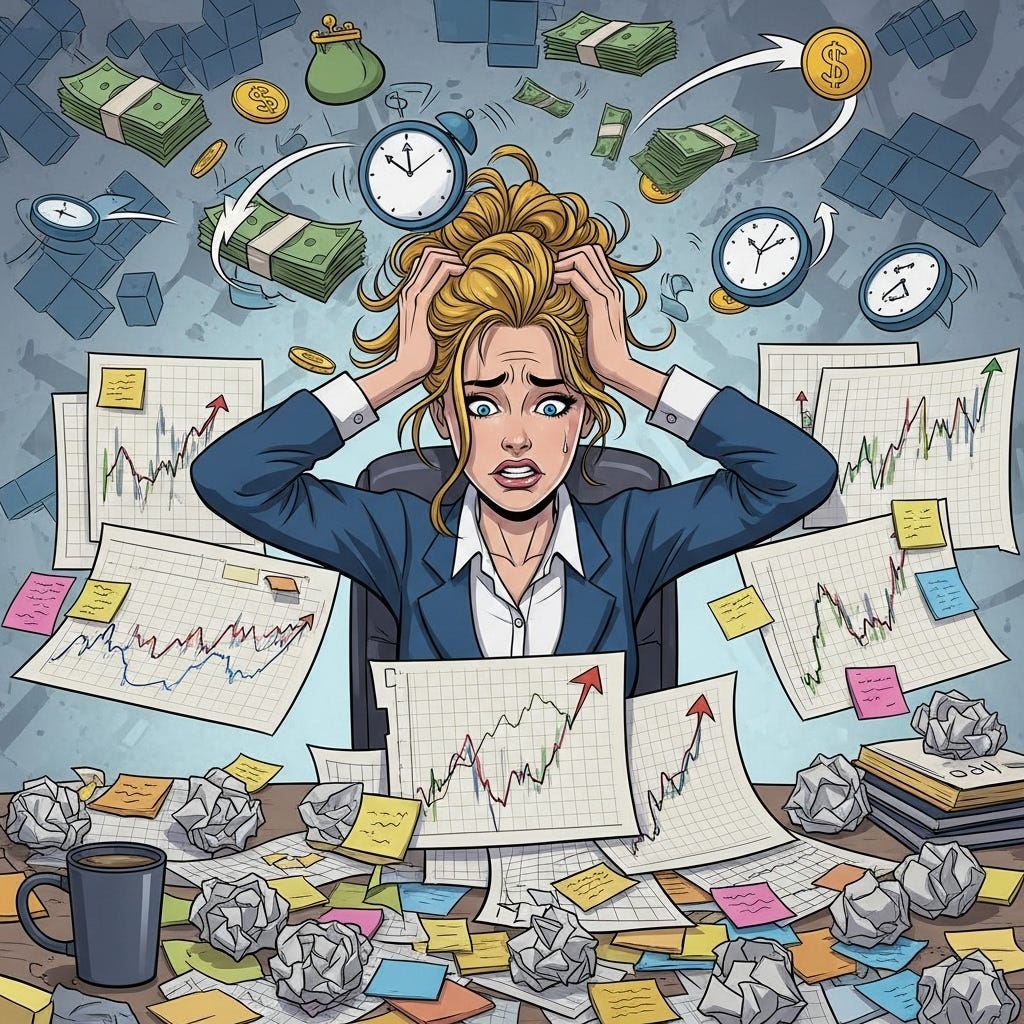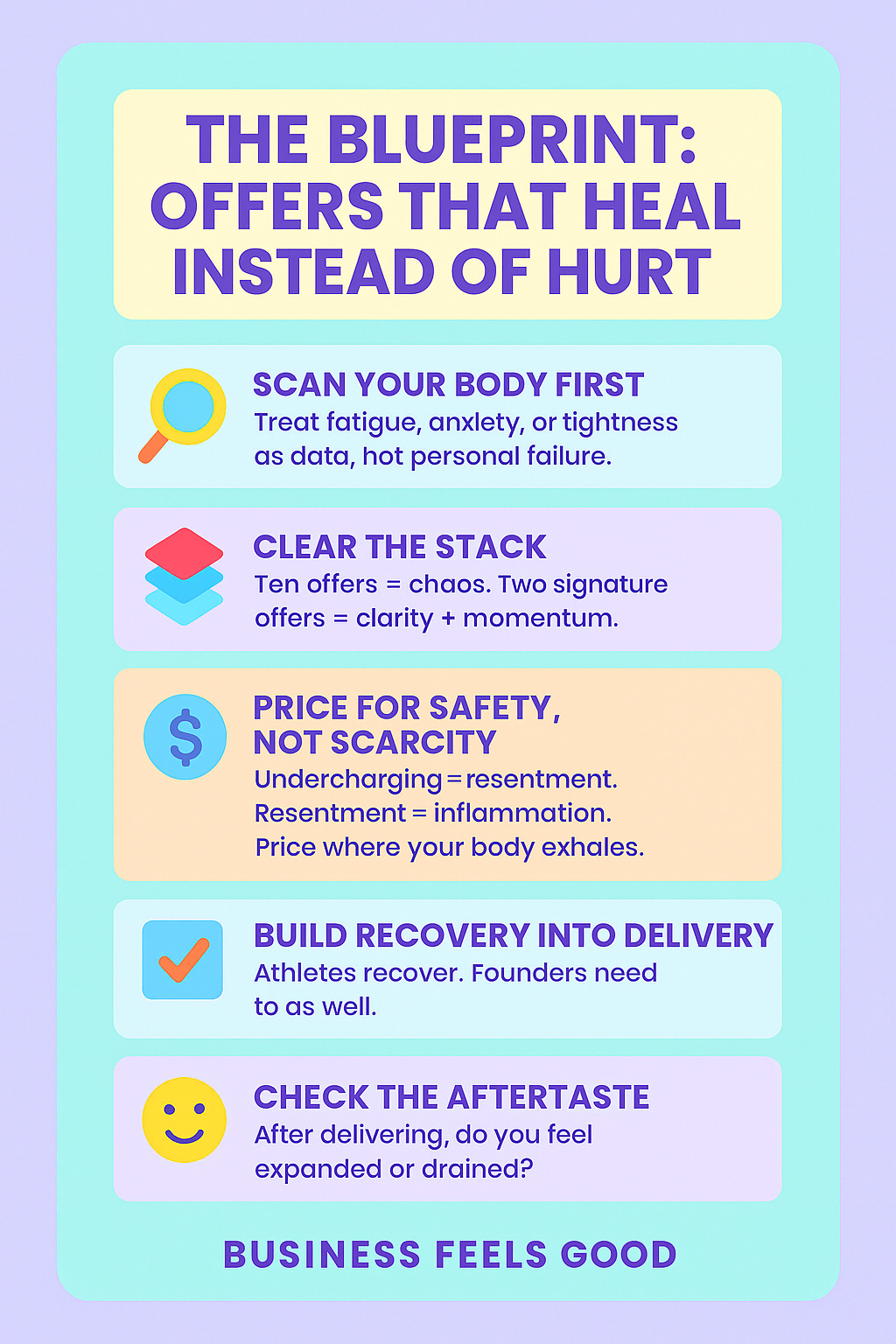4 Business Models Quietly Wrecking Your Nervous System ⚡️
From hourly traps to launch-addiction cycles, these common models aren’t just tiring you out, they’re torching your nervous system. Here’s how to flip them.
Here’s a line I hear all the time from founders:
“I don’t get it. I love what I do… so why am I always exhausted?”
Here’s the truth:
It’s not just the hustle. Not the late nights. Not even the caffeine rollercoaster.
It might be your business model itself.
The way you’re charging. The way you’re packaging. The way you’ve duct-taped your offers together like a Tetris board.
Note: I’ve used versions of this kind of offer design myself in the past (most of us have). This isn’t about blame or calling anyone out, it’s about awareness. Once I understood how certain business models were quietly flaring my nervous system, I realized I had to rebuild. This post is about sharing that lesson so you can design offers that actually sustain you instead of drain you.
The Body Doesn’t Lie
I’ve lived it.
The moment I realized my business model was working against my nervous system was the moment everything changed.
The structure looked strategic with steady workflow, clear deliverables—but my body was quietly sounding the alarm: constant tightness, shallow breathing, restless nights.
It wasn’t lack of discipline, it was misalignment.
And no strategy can outsmart a dysregulated nervous system.
The Hidden Drain
Every offer you create comes with a physiological cost.
How you design your offers = how your body reacts.
Hourly sessions → overactivate your stress response.
Overloaded group containers → drain emotional reserves.
Low-ticket funnels → feed the reward system, then crash it.
It’s not about discipline—it’s about design.
Your business structure can either regulate your nervous system or quietly deplete it.
4 Offer Types That Flare Your Nervous System
#1 The Hourly Trap ⏰
Looks simple. Feels safe.
But your nervous system braces every time your calendar fills.
Many service providers report anxiety about hours vs. income.
🍒 If your body tenses at Google Calendar, you’re not free, you’re in a cage.
#2 The Empathy Marathon 🏁💨
Group coaching with 50 people + Slack DMs + Friday calls = empathy overload.
Emotional exhaustion is cited as a top burnout trigger for founders across multiple studies.
🍒 Your care is a limited resource. Protect it like oxygen.
#3 The Launch-Addiction Cycle🎢
$97 dopamine hit → panic → crash. Repeat.
Founders relying heavily on launches often report significantly higher stress than those with recurring revenue models.
🍒 If your body contracts after launch week, that’s a signal, not just hustle fatigue.
#4 The Offer Infinity Loop ♾️
This one’s everywhere: Comment below for my system + bonuses + live challenge + VIP add-ons.
🍒 When every CTA is layered with urgency, bonuses, and stacked promises, it creates a nervous system flare, not safety.
Your Competitive Edge = Your Nervous System
Most coaches sell strategies that look shiny on spreadsheets but deplete your energy.
Here’s my stance:
Your body is the business model.
When your offers feel safe and aligned, you’ll:
Make sharper decisions
Create braver content
Attract clients who energize you
That’s not “woo.” That’s competitive advantage.
✏️ Try This Now
Grab a notebook.
Sketch your current offers.
Circle the ones that feel heavy.
Star ⭐ the ones that feel light.
Your job isn’t to grind harder.
It’s to re-engineer your business so it feels good to your body and your bank account.
Because if your body flares, your business eventually will too.
🔥 From Maxed Out To Mapped Out. That’s the work.
Thanks for reading. If this landed, the best way to support is by sharing it with someone who needs permission to listen to their body before their business plan.
P.S. If you want to see where your nervous system is right now, take the Business Health Reset Quiz - it’s about 10 minutes long and shows you exactly how much you’re pushing. For the full framework I use to structure my week around my energy (not my guilt), grab the Weekly Visual Roadmap template. Both are free.





